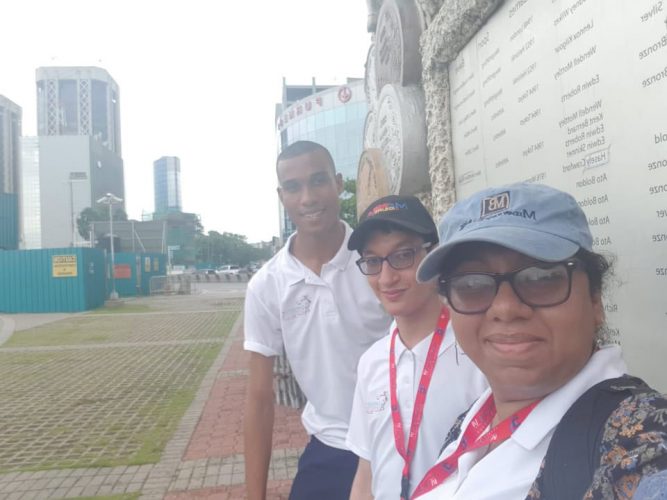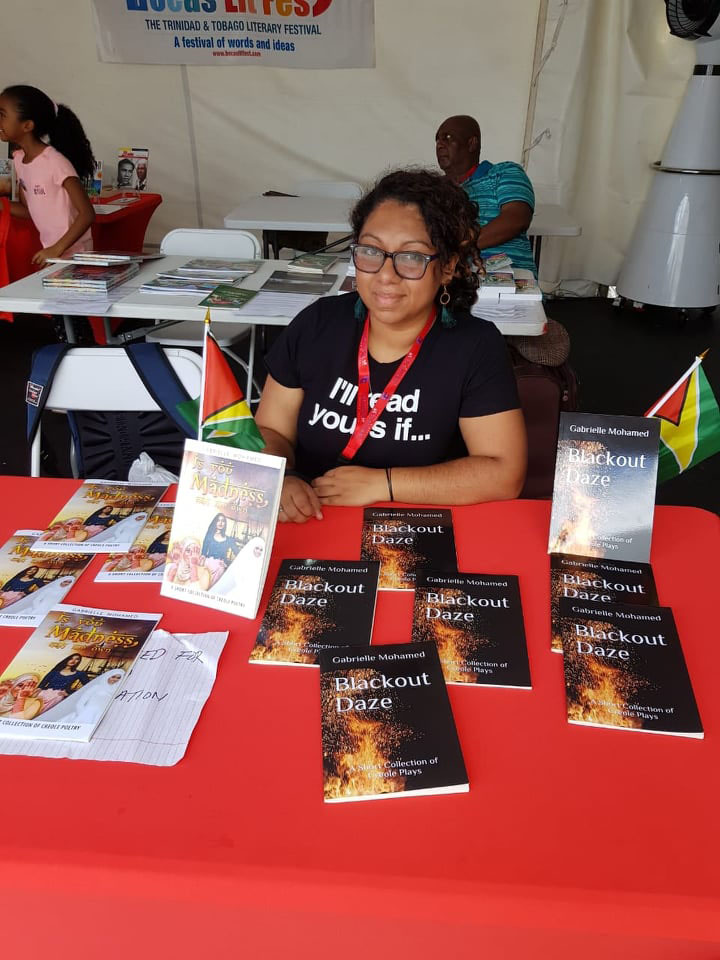Before they left for Trinidad and Tobago last month, the three youths who made up Guyana’s Literary Arts contingent for the Caribbean Festival of Arts (CARIFESTA) wanted to leave an everlasting impression of Guyanese literature on attendees.
Now that they have returned, they have no doubt that they have achieved their goal.
Gabrielle Mohamed, Daryll Goodchild and Scott Ting-A-Kee were selected to represent the country at CARIFESTA, which ran from August 16th to August 26th in Trinidad and Tobago. For Mohamed, it was her second CARIFESTA experience and it did not disappoint her. She went with the intention of creating connections with other writers and persons from the Caribbean, which she accomplished.
She took with her two self-published books—“Is you Madness, nah me own,” which is a short collection of Creole poetry, and “Blackout Daze,” which is a collection of Creole plays. Both were a hit and she sold numerous copies, which was an unexpected surprise. Before she left for CARIFESTA, Mohamed was uncertain about the reaction persons would have had towards the books because of the use of Guyanese Creole and the content of the books. However, upon arrival, she had no doubt that her chosen style of writing was relatable and “in demand.” She received positive feedback on both books. “Most individuals were drawn by my language of the heart. Other writers were also intrigued at my post-colonial engagement that was crafted in the whirlwind of fictional reality,” she said.
Mohamed disclosed that she too enjoyed the work of other writers from the various Caribbean countries and was impressed with their usage of Creole. She enjoyed the performance of a Bajan artist, DJ Simmons, who, she said, made excellent use of his pace, rhythm and native Bajan Creole to address issues of identity and culture loss.

Mohamed added that she is “very proud” to have participated in this year’s CARIFESTA with Goodchild and Ting-a-Kee. “Standing there with my colleagues in our small and sometimes unseen tent, our collective voices became the roar of a jaguar,” she said. They all helped pitch each other’s work and illustrated the “wealth” of each other’s writing style, she recounted.
When asked if the contingent’s “Guyaneseness” made an impression, Mohamed’s response was, “Definitely! We understand that people wanted to hear our Creole stories and history.”
Goodchild echoed Mohamed’s sentiments, saying, “Oh yes, definitely. We were among the only Creole artistes there and the responses were very fiery. I was pleased with the reception of the particular flavour Creole performances can bring to literary events.” Goodchild disclosed that he wished that he could have spent more time in Trinidad for CARIFESTA activities. He said the experience was a successful one for him personally as he was able to launch his new book, which other writers insisted on buying. Like Mohamed, he was able to breathe easier upon arrival and was happy to be around other writers, who he described as “buzzing with talent.”
Having launched his first book, Goodchild was eager to learn about publishing and spoke to many successful writers regarding the illustrating and publishing of his books. He said one such writer, Natalie Rochester, after listening to his ideas, told him that his themes concerning childhood could be developed into an entire series which her company would “love to explore” individually with him.
Robert Sandiford, one of the authors who insisted on buying Goodchild’s book which is titled “Crassing de Rivvah”, reportedly intently listened as the young writer described the project he was working on and when he mentioned that he wanted the book to be traditionally published because of its current themes and its genre as a fiction-fantasy novel, Sandiford gave him the contact information of his publishers and has committed to send guidelines via email.
Additionally, Goodchild said, one of the main reasons why he wished for a longer time at CARIFESTA is because many writers wanted to share ideas and knowledge with each other. He said he hopes that one day, he can experience, even if briefly, the literary freedoms of poetry and prose among his fellow Caribbean writers.






